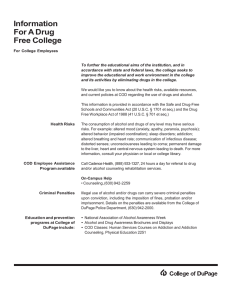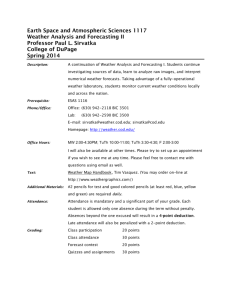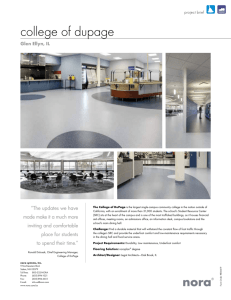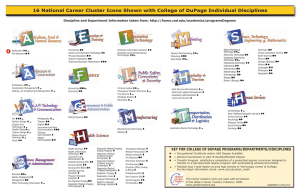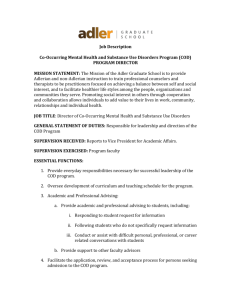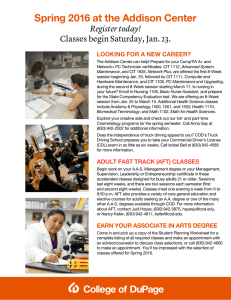Academic Divisions, Programs and Special Populations
advertisement
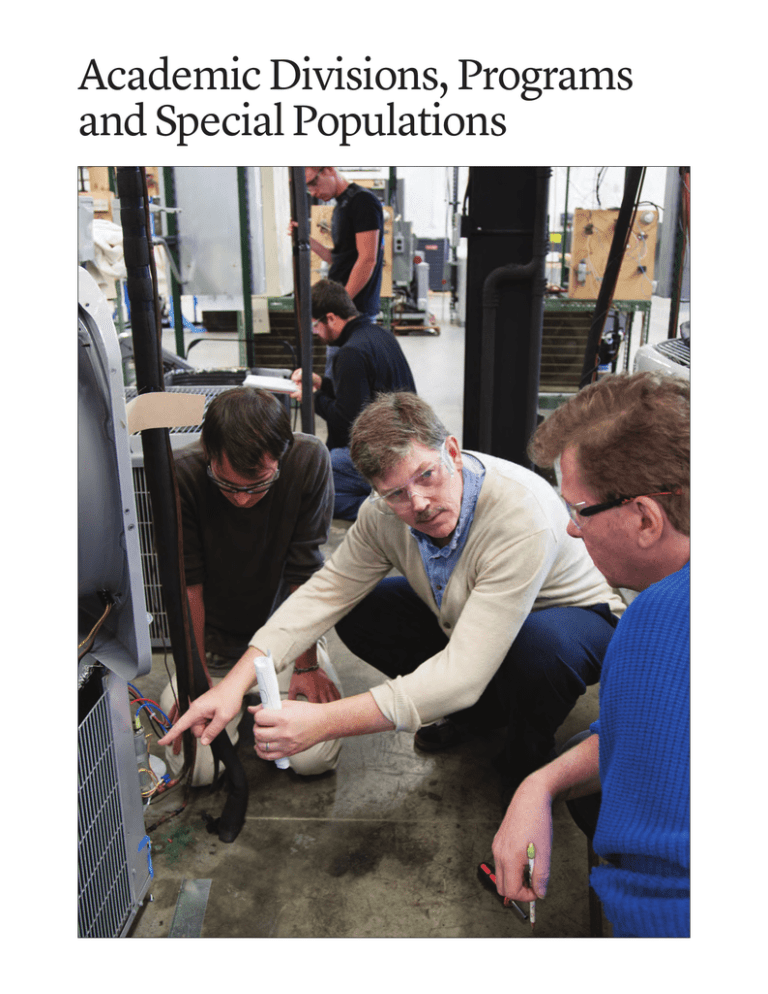
Academic Divisions, Programs and Special Populations ACADEMIC AFFAIRS Academic Innovation and Technology Academic Innovation & Technology provides leadership and support for the use of technology in teaching and learning. Online Courses College of DuPage offers a wide selection of online courses each semester, and certain degrees and certificates can be earned entirely online. In online courses, students interact with their instructor and classmates primarily through an online system called Blackboard. In most classes, a campus visit is not required. In online courses, students will read lectures, watch videos, submit assignments, take quizzes, interact with their classmates and do other course activities through the Blackboard system. Other online systems may also be required. Online courses follow the same schedule as traditional face-to-face classes, and students are usually required to do work each week. Online courses may require proctored exams, which can be taken on campus at the college, or at another approved location. Courses offered online cover the same material as sections of the same course offered on campus, and are recorded on transcripts in the same manner as campus courses. Students should visit the College of DuPage Online website at www.cod.edu/online for a list of online courses and degrees, as well as other supporting material, including specific technology requirements for online courses. Are these courses right for you? Online courses are the most convenient delivery method for instruction, but also require the most self-discipline in order to succeed. Students in online courses should have good reading, writing and study skills. Since there are no campus meeting times, students must be sure to log into the course frequently, pay attention to due dates, and complete assignments on their own. A tendency to fall behind in courses can become worse when the course is online. Students in online courses should also have good computer skills. Students will need to feel comfortable using a current web browser, uploading files, and using webcams and other computer equipment. Are these courses right for you? Students in hybrid courses need to have the same good reading, writing and study skills as students in online courses. Students should have good computer skills, and be able to use a current web browser, upload files and use webcams and other computer equipment. Students in hybrid courses should expect regular, weekly campus meetings—just like a traditional class. Students should not expect to be able to complete the course completely online. Adult Fast Track Adult Fast Track (AFT) offers an accelerated approach to degree or certificate completion and is specifically designed to accommodate the needs of adults who lead busy lives and are seriously committed to continuing their education. AFT currently offers an Associate in Arts (AA) degree, an Field and Experiential Learning Field and Experiential Learning courses include field-based, hands-on experiences that complement classroom curriculum. Courses take students out of the classroom to a variety of destinations locally, throughout the United States and around the world. For more information about Field and Experiential Learning, contact (630) 942-2356 or visit www.cod.edu/field. Global Education/Study Abroad Global Education serves the international and multicultural interest of the College through faculty and curriculum development, global organizations and cultural events. Study Abroad provides opportunities to earn college credit in a variety of disciplines while living and studying in countries around the world. For more information about Global Education/Study Abroad, contact (630) 942-2356 or visit www.cod.edu/field. Honors Program The College of DuPage Honors Program offers academically ambitious students courses that emphasize critical and creative thinking, providing them with opportunities to delve deeper into course materials and gain insight through lively classroom discussions in an enriched learning environment. The Honors program is designed for new and current College of DuPage students who are highly motivated, enjoy learning and want to make the most of their college years and beyond. Both fulltime and part-time students may join the Honors Program at any time. To participate in Honors, a student must meet the following criteria: Students new to college must have a high school cumulative GPA of 3.5 on a 4.0 scale or ACT score of 25 or above. Current COD students must complete no less than eight semester college-level credits with a cumulative grade point average (GPA) of at least 3.2 on a 4.0 scale. New College of DuPage students who meet the Honors eligibility criteria should visit the Admissions and Outreach office in the Student Services Center (SSC), or call (630) 9422380 to complete their registration. Current College of DuPage students who meet the Honors Program criteria should visit Counseling and Advising Services in SSC 3200 or call (630) 942-2259. Tuition is not waived for Honors classes; however, College of DuPage grants special scholarships to students who meet academic criteria at the time of initial admission to the College. For further information regarding these scholarships, please contact the Admissions and Outreach office at (630) 942-2482. Honors courses differ from regular courses by the type of work required and how the course is taught in terms of content depth, workload and pace. Honors courses promote advanced COD.EDU / ACADEMIC DIVISIONS, PROGRAMS AND SPECIAL POPULATIONS Hybrid Courses Hybrid courses combine the best features of online and classroom learning. Hybrid courses meet in person, but less frequently than in a traditional course. They also contain online lectures, videos, quizzes, discussions and other material and students complete significant parts of the course online. Hybrid courses follow the same semester schedule as traditional classes, and students are required to complete work each week. Associate in Applied Science (AAS) degree in Management and Management, Supervision, Organizational Leadership and Entrepreneurship certificates. Students may also enroll in one or more AFT courses and apply the credits earned to other College of DuPage degrees and certificate programs. AFT courses are offered in an eight-week format and students generally attend one regularly scheduled four-hour class session per week. Classes typically meet in the evenings from 6 to 9:50 p.m. and are currently offered at four convenient locations: the main campus in Glen Ellyn, and the Westmont, Addison and Naperville Regional Centers. Please note that all AFT classes may not be available at all locations. Any student who is 21 years of age or older may enroll in AFT classes any time prior to the start date of a new eight-week session as determined by his/her assigned registration date. For more information, call (630) 942-FAST or log on to www.cod.edu/fast. 99 thinking skills, such as application and analysis. Most Honors courses fulfill the general education requirements that are part of the core curriculum for any major, while some meet the elective credit hours needed to earn an associate’s degree or complete a certificate program. For a student to earn an Honors Scholar designation on their College of DuPage transcript, 15 credits of Honors courses must be earned which include completing an Honors seminar and/or the Humanities 2210, Leadership Development course. In addition, College of DuPage recognizes graduating Honors Scholars each spring at the Celebration of Academic Excellence. For further information, contact the Honors Office at (630) 942-3318 or the Office of Academic Affairs at (630) 942-3249 or visit www.cod.edu/honors. Workforce Development Workforce Development efforts at College of DuPage are comprehensive and integrated into how the institution serves students and communities in District 502. It is directly tied to the mission of the College through guiding principles and institutional priorities related to access, affordability, workplace readiness, career and technical education, community development, and obtaining skills associated with cuttingedge technology. The College establishes and maintains positive working relationships and special partnerships with area employers, non-profit agencies, industry and trade associations, school districts, and colleges and universities. Workforce Development educational opportunities and support services are focused on the needs of unemployed/ underemployed residents in the area as well as those seeking a new career that requires specialized short-term training, and/or a college certificate or degree. Workforce Development services also assist with the financial assistance process through the Workforce Investment Act (WIA).For more information contact the College of DuPage staff located at the WorkNet DuPage Center, 2525 Cabot Drive in Lisle, (630) 942-2389. COD.EDU / COLLEGE OF DUPAGE CATALOG 2015-2017 BUSINESS AND TECHNOLOGY DIVISION 100 Always aware of the current and emerging trends in business, industry and computer technology, the Business and Technology Division prepares its students with the skills needed for immediate success in the job market and with a solid academic base for continuing their education at a degreegranting institution. Faculty program coordinators work closely with business and industry through advisory committees to maintain current and relevant curricula. Faculty have real-world experience to bring to their classes, ensuring that students receive a strong combined theory and applied approach to learning, realistic career guidance, and practical career skills. Business programs include Accounting, Business/ Management/Marketing/Business Law, Paralegal Studies, Interior Design, Fashion Studies, Culinary Arts, Hospitality and Tourism Management and Cosmetology. Technology programs include Computer and Internetworking Technologies, Computer Information Systems, Office Technology Information, Library and Information Technology, Architecture, Automotive Service Technology, Construction Management, Heating, Air Conditioning and Refrigeration, Horticulture, Manufacturing, Welding, Electronics Technology and Electro-Mechanical Technology. CONTINUING EDUCATION AND EXTENDED LEARNING DIVISION Continuing Education classes are offered on campus in Glen Ellyn and at more than 25 off-campus locations, including College of DuPage Regional Centers, high schools, local businesses and other convenient locations. Contact the Continuing Education Division for more information at (630) 942-2208 or visit www.cod.edu/conted. Continuing Education strives to identify and meet regional educational needs and special interests of students through both credit and non-credit courses and certificate programs. Continuing Education conducts rapid research and program development to serve the ever-evolving educational interests and career needs of the region’s citizens and businesses. Flexible schedules, varied pricing and multiple delivery models allow Continuing Education to increase accessibility to education whether students are looking for personal enrichment or professional development. Particular attention is paid to the non-traditional student, with an emphasis on connecting learning experiences and exploring career pathways. Continuing Education also seeks to connect individuals, professionals, companies and organizations in support of educational opportunities that improve quality of life and regional economic vitality. ADULT BASIC EDUCATION, GED PREPARATION AND ESL Adult Education Program Tuition-free Adult Education classes are funded by state and federal grants. Adult Education classes assist adults in becoming literate, in obtaining knowledge and skills necessary for employment and self-sufficiency, in obtaining educational skills necessary to become full partners in their children’s education, and in completing their secondary school education. Eligible participants in the program are adults who are not enrolled or required to be enrolled in secondary school and who lack sufficient mastery of basic educational skills to enable the individuals to function effectively in society; do not have a secondary school diploma or its recognized equivalent and have achieved an equivalent level of education; or who are unable to speak, read or write the English language. College of DuPage emphasizes bridge programming, which prepares Adult Education students for success in higher education and the workplace. Adult Literacy and Basic Education Tuition-free Adult Basic Education (ABE) courses serve adults who do not have a high school diploma and who need to develop basic skills reading, spelling, grammar, writing, math or problem-solving skills. Adults reading below sixth-grade level are advised to begin their GED Test preparation here. For more information, call (630) 942-3697. U.S. Citizenship This tuition-free course serves adults who are preparing to take the test for U.S. citizenship. It provides an overview of American history; federal, state and local government; U.S. customs, institutions, citizenship rights and responsibilities; and the Illinois and U.S. Constitutions. Instruction is restricted to English. For more information, call (630) 942-3697. Pre-GED Preparation Tuition-free Adult Basic Education (ABE) courses serve adults who do not have a U.S. high school diploma and who need to refine their skills in reading, spelling, grammar, writing, math or problem solving. Many adults begin their preparation for the GED Test in the Pre-GED program. Recommended for adults reading at a 6.0 to 8.9 level. For more information, call (630) 942-3697. GED Preparation Tuition-free General Education Development courses serve adults who lack a U.S. high school diploma, have a 9.0 reading level and need to prepare to take the GED test to earn a High School Equivalency Certificate. Instruction is offered in the six areas covered on the GED Test: Reading, Writing, Mathematics, Science, Social Studies, and the U.S. and Illinois Constitutions. Instruction also prepares students to write the required essay. Instruction is available in English or Spanish and is recommended for students reading at least at a 9.0 level. For more information, call (630) 942-3697. Online GED Preparation Tuition-free Illinois State authorized GED-I is used to help students prepare for the GED test via computer under the guidance of a College of DuPage instructor. To qualify for this online course, a student must score 9.0 in reading and 8.0 in math on the required placement test. Adult ESL Tuition-free Adult ESL classes serve adults whose first or primary language is not English and who wish to understand, speak, read and write English for everyday use. Beginning through advanced-level courses are offered at locations throughout the district. This program helps adults engage more fully in the community and the workplace by improving their English skills. For more information, call (630) 942-3697. ESL Family Literacy Tuition-free ESL Family Literacy is an integrated program of instruction that helps non-English language background parents learn the English language and other skills needed to become primary teachers for their children and economically self-sufficient. For more information, call (630) 942-3697. Early Childhood Center The Early Childhood Center at College of DuPage provides educational experiences for students who are pursuing coursework in Early Childhood Education, Education, Psychology, or Speech and Language Pathology. Students may observe or participate with young children in the Center dependent on their class assignments. The classrooms are staffed by teachers who provide curriculum supportive of the developmental needs of children. The Center offers full-time toddler, preschool and kindergarten classes College of DuPage Business Solutions – Career and Professional Development Business Solutions meets the evolving needs of regional employers and employees. Business Solutions offers affordable, customized contract training, emergency planning and first responder courses, online courses and certificates through Ed2Go and Gatlin, test preparation, as well as training through the Suburban Law Enforcement Academy. Business Solutions also develops several short-term training programs that are ideally suited for those who want specialized skills and knowledge for career advancement. Certificate programs are available in health care, including online health care training through Career Step (www.cod.edu/careerstep), commercial driver’s license (www.cod.edu/cdl), massage therapy (www.cod.edu/massagetherapy), project management and training in a wide variety of professional fields. Center for Entrepreneurship The Center for Entrepreneurship provides free consulting, workshops and training through its three areas of expertise: • The Small Business Development Center, which assists entrepreneurs and small business managers in the areas of business management, marketing, finance and operations, and assistance in disaster preparedness, including business continuity and recovery planning. • The Illinois Procurement Technical Assistance Center, which is designed for increasing business with the government, or improving the current level of government contracting. • The Illinois International Trade Center, which offers free market research and consulting assistance to Illinois companies that are interested in exporting their products or services. Lifelong Learning Institute (Formerly Older Adult Institute) The Lifelong Learning Institute (LLI) provides individuals 55 years of age and older with a wide range of educational opportunities to learn new skills, pursue an interest and be part of a community of learners. Daytime and evening courses, special events, and Lunch Break Lectures are offered at the Glen Ellyn campus and at several other convenient locations. Homeland Security Training Institute (HSTI) and Suburban Law Enforcement Academy (SLEA) In September 2011, College of DuPage opened the stateof-the-art Homeland Security Education Center (HEC) as the cornerstone facility for the new Homeland Security Training Institute (HSTI), which brings together experts from law enforcement, fire science and first response, counterterrorism, the private sector, emergency planning and disaster preparedness, and the incident command protocols for integrated professional development. The HEC offers the first non-military 4-D indoor training complex; forensic, cyber and Internet investigation labs; smoke, EMS and building construction labs; emergency operations center and a mock courtroom. The Homeland Security Training Institute offers COD.EDU / ACADEMIC DIVISIONS, PROGRAMS AND SPECIAL POPULATIONS Adult Enrichment Adult Enrichment courses are available in a variety of subject areas including, but not limited to, arts, astronomy, computers, finance and investment, health and wellness, history and humanities, hobby and recreation, home and garden, languages and music lessons. The Lifelong Learning Institute offers classes of particular interest to students over the age of 55. The new Reach Out program enables students with mild to moderate developmental disabilities to develop their living skills in a social setting. The Adult Education and English as a Second Language (ESL) programs serve 6,500 people each year with free classes on basic skills, English, civics, and preparing to pass the GED exam. Volunteers in the People Educating People (PEP) program assist adults with reading, writing, math and English skills. between the hours of 7 a.m. and 6 p.m., and part-time preschool classes from 8:45 to 11:15 a.m., Monday to Friday, or 1:15 to 3:45 p.m., Tuesday to Friday. Learning experiences are appropriate for the age and development of each child. All classes provide play-based curriculum planned to foster the physical, social, emotional and intellectual development of each child. For more information about either enrolling a child in the Early Childhood Center or using the Center as an observation site, call (630) 942-4223. 101 both credit and non-credit courses to serve the needs of the modern emergency planner and first responder. In 2015, College of DuPage will open phase II of HSTI with the opening of the Homeland Security Training Center (HTC). This facility will offer state-of-the-art first responder training simulators, a 911 call center training lab, a 24-position, 150-yard live fire tactical range as well as multi-use classrooms to support HSTI courses and training programs. College of DuPage is proud to be the home of one of only six law enforcement academies in Illinois accredited by the Illinois Law Enforcement Training and Standards Board (ILETSB). The Suburban Law Enforcement Academy is comprised of the Basic Police Recruit Academy and the Law Enforcement Continuing Education program, and has trained more than 2,600 recruits and 25,000 law enforcement professionals since its inception in 1994. The Basic Academy is authorized by the ILETSB to conduct the 480-hour (12-week) Basic Law Enforcement Officers course four times per year. Upon completing the training, recruits are prepared to take the State of Illinois certification examination and earn academic credit from College of DuPage. The Continuing Education program delivers a wide variety of non-credit law enforcement training opportunities to qualified law enforcement personnel throughout the district and surrounding sites. For more information about Suburban Law Enforcement Academy programs and courses, please call (630) 942-2677 or visit www.cod.edu/slea. COD.EDU / COLLEGE OF DUPAGE CATALOG 2015-2017 Youth Education The Youth Academy offers a year-round, wide spectrum of enrichment and reinforcement opportunities to children and youth from 15 months through high school. College of DuPage Youth Academy partners with and administers District 204’s summer high school program and looks to bridge learning and skill gaps between secondary and post-secondary schools while also contextualizing learning to expose young adults to future career pathways. 102 The Youth Academy includes: • Early Childhood Center (Day Care and Kindergarten) • Elementary, Middle School and High School Enrichment • Explorer Camp • High School Credit (Advancement and Recovery) • Talent Search • Teen Xtreme • Test Preparation • Tutoring and Music Lessons • Youth Leadership Program • College Credit for High School Students • Blackrocket Computer Programs • Leadership Training • College Prep and Career Exploration HEALTH AND SCIENCES DIVISION The Health and Sciences Division is comprised of five subdivisions: Health and Biological Sciences, Nursing and Health Sciences, Math and Physical Sciences, Physical Education, and Social and Behavioral Sciences. Health and Biological Sciences Students in the Health Sciences and Biological Sciences sub-division are prepared for direct entry into professional, semiprofessional, technical and skilled employment. Some students, however, elect to continue their education through articulated capstone programs at baccalaureate-degree granting colleges and universities either at the time of graduation or after several years of clinical practice. Knowledge and skill requirements are constantly changing in the health and sciences fields. The Health and Sciences Division keeps pace with these changes through an expert faculty with work experience and professional degrees, upto-date technological resources, and the guidance of advisory committees comprised of representatives from business and industry, health and public service agencies, and institutions. Through these mechanisms the Division strives to advise students about current job requirements and labor market conditions, facilitate employment, and meet the diverse manpower needs of the College district. Located in a state-of-the-art facility, the Health and Science Center houses classrooms and laboratories. Supervised clinical health care experiences are provided at area hospitals and clinics. Due to the prerequisite education required, as well as limited technological and clinical resource availability, the College has special admissions processes for the following health care programs in the Health and Biological Sciences sub-division: Dental Hygiene, Diagnostic Medical Imaging programs: Vascular and General Ultrasound, Nuclear Medicine, Radiologic Technology, Cardiac Interventional Radiographic Specialist, Radiation Therapy, Proton Therapy, Perioperative Nursing, Mammography, Computed Tomography, Respiratory Care, and Surgical Technology. Candidates for these programs must submit applications with an application fee, and meet admissions criteria beyond that required for enrollment at College of DuPage. Group advising sessions are offered regularly for the majority of these programs. For information about admission into the various Health Sciences programs, contact the Admissions and Outreach office, (630) 942-2380. Other health science career programs such as Central Sterile Processing Technician and Emergency Medical Technician and Paramedic are open enrollment and, while do not require separate admission, do require verification of program requirements prior to admission. Additional programming in other areas is currently under consideration. The biological sciences in this sub-division include Anatomy/ Physiology, Biology, Botany, Chemistry, Microbiology, and Zoology. These disciplines examine the components of the living world and their interactions with the physical world. Applications of the life sciences to the environment, the ecosystem and living organisms are an integral part of these courses. Chemistry is the science that deals with the composition, structure, and properties of substances and the changes they undergo. For more information, call (630) 942-8331 or visit www.cod.edu/hsadmissions. Nursing and Health Sciences Students in the Nursing and Health Sciences sub-division are prepared to take certifying exams (when required) and enter a career as professional, semi-professional, technical, or skilled employees. Additionally, opportunities exist for continued education both at College of DuPage and through articulated capstone programs at baccalaureate-degree granting colleges and universities either at the time of graduation or after several years of clinical practice. Knowledge and skill requirements are constantly changing in the health science fields. The Nursing and Health Sciences sub-division keeps pace with these changes through an expert faculty with work experience and professional degrees, upto-date technological resources, and the guidance of advisory committees comprised of representatives from business and industry, health and public service agencies, and institutions. Through these mechanisms the division strives to advise students about current job requirements and labor market conditions, facilitate employment, and meet the diverse manpower needs of the College district. The Nursing (Associate Degree in Nursing (ADN), and Basic Nursing Assistant (BNA), Medical Assistant, Health Information Technology, Physical Therapist Assistant, Speech Language Pathology Assistant, Long Term Care, Phlebotomy/ EKG, and Pharmacy Tech (credit only) programs are in the Nursing and Health Sciences sub-division and are located in the Health and Science Center, a state-of-the-art facility that houses classrooms and laboratories. Supervised clinical health care experiences are provided at area hospitals, nursing homes and clinics. Due to the prerequisite education required, as well as limited technological and clinical resource availability, the College has special admissions processes for the Nursing, Medical Assistant, Health Information Technology, Physical Therapist Assistant, and Speech Language Therapy Assistant programs. Candidates for these programs must submit applications with an application fee, and meet admission criteria beyond that required for enrollment at College of DuPage. The Phlebotomy/EKG, Physician Office Coding and Billing, Pharmacy Tech (credit) and Long Term Care programs are open enrollment and do not have a specific admission process. Group advising sessions are offered regularly for the majority of these programs. For information about admission into the various Health Sciences and Nursing programs, contact the Admissions and Outreach office, (630) 942-2380. Also, as a part of the admission process and/or prior to placement in the clinical setting, the student must complete select clinical participation requirements. These may include but are not limited to: CPR, criminal background checks and meeting of health requirements, including drug screening. Note: Most health programs require students to attend advising sessions. For assistance with advising and admissions questions, please contact the Health Services Program Advising office at (630) 942-2259 or schedule an appoint by email at healthcareadvising@cod.edu. Math and Physical Sciences The study of math provides the tools that enable an understanding of quantitative relationships found in business and technology, as well as natural and social sciences. Engineering combines the principles of sciences and math with the principles of problem solving to provide advances in technology. Physical science courses include physics and earth, space and atmospheric sciences offerings designed to teach natural laws and theories governing interactions of particles from the infinitesimally small to the astronomically large. The applications of the laws of nature to human endeavor continue to astonish learners. For more information, call (630) 942-2010 or visit www.cod.edu/math. Physical Education Physical Education prepares students who intend to study kinesiology, exercise science, sports, and teaching professions, as well as students who wish to take elective credit and obtain the knowledge, skills and practical fitness experience that will Social and Behavioral Sciences Faculty in the Social and Behavioral Sciences seek to cultivate in students a broad perspective on human behavior, our cultural heritage and our relationships with others, our social institutions, and the environment. Eleven subject areas are included: Anthropology, Criminal Justice, Economics, Early Childhood Education and Care, Education, Geography, Human Services, Political Science, Psychology, Social Science and Sociology. In addition to imparting knowledge of academic disciplines, the faculty challenges the learner to critically examine values, ideologies, social structures, political arrangements and accepted assumptions. Degrees and certificates are offered in the disciplines of Anthropology, Criminal Justice, Early Childhood Education and Care, Education, Geography, and Human Services. For more information, call (630) 942-2010 or visit www.cod.edu/sbs. LEARNING RESOURCES DIVISION The Learning Resources Division encompasses a number of academic support departments, including Learning Commons, the Library and the Testing Center. Learning Commons The Learning Commons provides Tutoring services and Math, Reading, Writing and Speech assistance. It also offers COD placement test preparation resources and workshops and Blackboard and myAccess support. Services are free of charge and serve students who are having difficulty completing their coursework or are seeking to enhance their grades. The off-campus Learning Commons in the Carol Stream, Naperville and Westmont Regional Centers provide testing services, digital library resources, and a student computer lab. At these locations, students can meet with an instructor, work independently or collaborate in small groups on projects in a one-stop environment. The Learning Commons are open day, evening and weekend hours at the following locations: Learning Commons — Glen Ellyn 425 Fawell Blvd. Student Resource Center (SRC), Room 2102 Glen Ellyn, IL 60137-6599 (630) 942-2131 Learning Commons — Carol Stream Carol Stream Regional Center 500 Kuhn Road Carol Stream, IL 60188 (630) 942-4900 Learning Commons — Naperville Naperville Regional Center 1223 Rickert Drive Naperville, IL 60540-0954 (630) 942-4750 COD.EDU / ACADEMIC DIVISIONS, PROGRAMS AND SPECIAL POPULATIONS For more information please check out these web pages: • Nursing Department www.cod.edu/programs/nursing • Associate Degree Nursing www.cod.edu/adn • Basic Nursing Assistant www.cod.edu/bna • Health Information Technology www.cod.edu/hit • Physical Therapist Assistant www.cod.edu/pta • Speech Language Pathology Assistant www.cod.edu/slpa • Medical Assistant www.cod.edu/med_assist enable them to achieve and maintain a healthy and active lifestyle. Traditional and non-traditional students of all ages take classes through Physical Education to improve their personal wellness and learn how physical fitness, exercise, recreational and sports activities contribute to lifetime health and wellness. The Fitness Instructor and Sports Performance Instructor certificates prepare students for successful completion of national certifying fitness instructor exams and entry-level positions in the health and fitness profession. For more information, call (630) 942-2364 or visit www.cod.edu/phys_ed. 103 Learning Commons — Westmont Westmont Regional Center 650 Pasquinelli Drive Westmont, IL 60559-1252 (630) 942-4850 Information Literacy Instruction Program The mission of the Library’s Information Literacy Instruction Program is to teach students to be effective users and producers of ideas and information. The program provides students with varied opportunities for acquiring the needed knowledge and skills to become information literate. The program is administered through class sessions with library faculty, free workshops and the Library’s Research 101 online tutorial at www.cod.edu/library/research/research101. COD.EDU / COLLEGE OF DUPAGE CATALOG 2015-2017 Library The Library serves all academic programs offered at all COD locations, providing teaching and learning materials to support and enrich students’ educational experience. The 100,000-square-foot facility in the Student Resource Center on the Glen Ellyn campus provides comfortable seating, individual study space, group study rooms, public computers and AV equipment for use by students. The Library houses a wide variety of informational resources for students, faculty, staff and community members. These materials include more than 225,000 books, 480 current periodicals, and many non-print materials such as ebooks, DVDs, music CDs and audiobooks. The Library’s website, www.cod.edu/library, is the gateway to a wide variety of library services and research resources. An online catalog provides easy look-up of library materials. Also available are many specialized research databases with factual information and references to journal, magazine and newspaper articles, many of them full text. These may be accessed remotely by registered Library users. Every public computer in the Library also has full Internet access and a variety of applications such as word processing, spreadsheet and presentation software. Library services include the circulation of print and nonprint materials, reference service, library and information literacy instruction, interlibrary loan and access to computers. Specialized collections include the Career and College Information Collection (CCIC) and the Philanthropy Center. The Circulation Desk provides borrowers’ services and checks out audiovisual equipment to students, faculty and staff. Classroom delivery of equipment is provided upon the request of the instructor. For more information about the Library and its services, call (630) 942-2350, or visit www.cod.edu/library. 104 Testing Center The Testing Center provides both academic and specialized testing to assist College of DuPage students and community members. The Academic Testing department administers the COMPASS placement tests and some course tests, as well as the TABE test, Health Science program entrance exams, and career interest and personality inventory tests. The Specialized Testing department administers the GED Tests, proctored exams and high-stakes certification exams, including Pearson Vue, CLEP and Castle Worldwide. Many testing services are also offered at College of DuPage regional centers. For more information, please contact (630) 942-2400 or visit www.cod.edu/testing. GED Testing College of DuPage is the official site for administration of the General Educational Development (GED) Tests for DuPage County residents. GED Testing offers adults who have not completed high school the opportunity to take the GED Tests and earn the Illinois High School Equivalency Certificate from the State of Illinois. The GED Tests are only available on the computer. For more information or to register to take the GED Tests, visit www.GED.com. No formal preparation is required to take the GED Tests; however, individuals may take GED preparation courses through the College. For information about GED preparation courses, contact Continuing Education at (630) 942-3697 or visit www.cod.edu/academics/conted/basic/ged. LIBERAL ARTS DIVISION The Liberal Arts Division is comprised of three sub-divisions: English/Academic ESL, Fine and Applied Arts, and Humanities/Speech Communication. English/Academic ESL English/Academic ESL includes studies in English Composition, Developmental Reading and Writing, Creative Writing, Technical and Professional Writing, Linguistics, Literature, Film and Academic ESL. These disciplines provide an educational framework within which students develop their abilities to think critically and to express themselves clearly, effectively and creatively to different audiences. Many of the courses in English/Academic ESL satisfy general education requirements for graduation and can be transferred to other institutions. Many courses also feature enriched learning experiences for students, including service learning projects, experiential learning and field-based research, peer mentoring opportunities, and extended learning communities. Students in English/Academic ESL are provided educational opportunities to: • develop a range of strategies for listening, reading, and writing more effectively; • acquire critical information literacy skills, including the ability to locate, evaluate, and synthesize information from a variety of sources and for different purposes; • nurture a deeper aesthetic awareness and the capacity for meaningful self-expression; • cultivate their ability to think critically and to respond creatively to complex problems and situations; • enhance their understanding of and respect for personal, social and cultural diversity; • foster greater rhetorical sensitivity, including the ability to consider a variety of perspectives and audiences when communicating; • explore a wide number of genres and styles in academic, professional, and public settings; • understand and effectively use a range of technologies for researching and communicating in 21st century contexts. English faculty sponsor student curricular activities, including Prairie Light Review and the Writers Read series. For more information, call (630) 942-2047 or visit www.cod.edu/ student_life/student_publications.aspx. The Academic ESL program offers upper-level, tuitionbased courses to prepare individuals for study at U.S. colleges and for professional employment in the United States. This program offers courses in listening and speaking, reading, writing and grammar. Language and culture courses focus on cross-cultural communication. For more information, call (630) 942-2047 or visit www.cod.edu/programs/esl. Fine and Applied Arts Fine and Applied Arts encompass a broad range of arts courses and programs that provide students with an opportunity to create, perform, study and participate in the arts. Disciplines and programs in Fine and Applied Arts include transfer courses in Studio Arts (Drawing, Painting, Computer Art, Ceramics, Jewelry, Printmaking, Sculpture), Dance, Music and Music Technology, Applied Music, Theater, and Mass Communication. Many of the courses in the Fine Arts satisfy the general education requirement for graduation and can be transferred to other institutions. The applied programs include transfer and career and technical education training in Graphic Design, Motion Picture/Television, and Photography. Both associate’s degrees and certificates are offered in the Applied Arts programs. Students in the Fine and Applied Arts are provided opportunities to: • employ a variety of artistic media as a means of personal expression; • develop their understanding and perception of sensory materials and messages in creating, producing, displaying and interpreting works of art in a broad range of media; • develop original ideas, tap creative impulses and stimulate the imagination; • develop analytical and evaluative skills and the ability to articulate critical insights into the arts; • participate in theater, music, film and dance in educational and public settings; • study practical, commercial, historical, social and cultural contexts for the arts; • study and employ appropriate tools, technologies, techniques and materials in the creation of works of art. Faculty in the Fine and Applied Arts are working artists and performers, and those in the Applied Arts have industry experience. The faculty is committed to providing students with a full understanding of the arts and opportunities to participate in and perform in a broad range of student performance groups, including groups in music and theater, and in exhibiting work in the Student Art Gallery and other venues on and off-campus. For more information about the Fine and Applied Arts, call (630) 942-2048 or visit www.cod.edu/liberal_arts. Speech Communication focuses on the study and development of human communication skills in a variety of contexts. While oral communication is the central focus of many Speech Communication classes, the field unites a variety of disciplinary perspectives in exploring how humans create, exchange and receive messages. Students in Speech Communication are provided educational opportunities to: • Explore group interaction strategies; • Develop poise and confidence in public speaking; • Apply ethical persuasive strategies; • Apply productive techniques for conflict resolution; • Develop artistic creativity and expression; • Consider multiple viewpoints and perspectives; • Explore techniques to communicate more effectively with persons from other cultures; • Explore increasing technological innovations and their impacts to message production and reception; • Develop effective listening skills; and • Explore interactive approaches to corporate culture and public relations. Speech Communication faculty also coordinate co-curricular activities such as the Forensics (speech and debate) team in order to extend learning opportunities beyond the classroom. For more information, visit www.cod.edu/speech. McAninch Arts Center The McAninch Arts Center (MAC) at College of DuPage is home to more than 140 events annually and hosts a vibrant professional touring series as well as the Fine and Applied Arts student performances. The facility is the preeminent regional center for arts education and presentation in the district and features three newly renovated performance venues, the new Cleve Carney Art Gallery, the new outdoor Lakeside Pavilion, and state-of-the art classrooms and studios. The MAC provides students and community members with an eclectic mix of music, theater, dance and visual arts by regional, national and international artists. Since opening its doors in October 1986, the McAninch Arts Center has been focused on enriching the community with world-class entertainment opportunities that go beyond the stage. Through community engagement and education programs, including pre-performance lectures, classes with visiting artists and events for K-12 schoolchildren, the MAC provides residents with interactive arts experiences that engage, enlighten and entertain. The MAC is committed to enriching the cultural vitality of the community. This commitment to increasing community access to the arts has earned the McAninch Arts Center the Illinois Arts Council’s Partners in Excellence designation, which recognizes 40 of the most significant cultural institutions in the state. For more information, call (630) 942-3008 or visit www.atthemac.org. COD.EDU / ACADEMIC DIVISIONS, PROGRAMS AND SPECIAL POPULATIONS Humanities and Speech Communication Humanities includes subject areas that address the question of what it means to be human. Subject areas in the Humanities include History, Humanities, Languages, Philosophy and Religious Studies. The study of Humanities frees students to think beyond personal and cultural boundaries and to consider informed actions that have constructive outcomes for the future. Many of the courses in Humanities satisfy the general education requirements for graduation and can be transferred to other institutions. Students in Humanities are provided educational opportunities to: • develop skills in analysis, synthesis, and evaluation of readings and writings related to the Humanities; • develop an understanding of history, philosophy, religious studies, the arts and cultural contexts; • develop an awareness of human spiritual, intellectual, social and political aspirations; • develop insight into various cultures through the study of history, world languages, the arts, philosophical and religious texts; • develop creative and critical thinking skills. Humanities faculty are committed to providing high quality educational and intellectual opportunities that challenge students to reflect critically on themselves and the world around them. For specific information about History, Humanities, Languages, Philosophy and Religious Studies, call (630) 942-2047 or visit www.cod.edu/liberal_arts. 105
